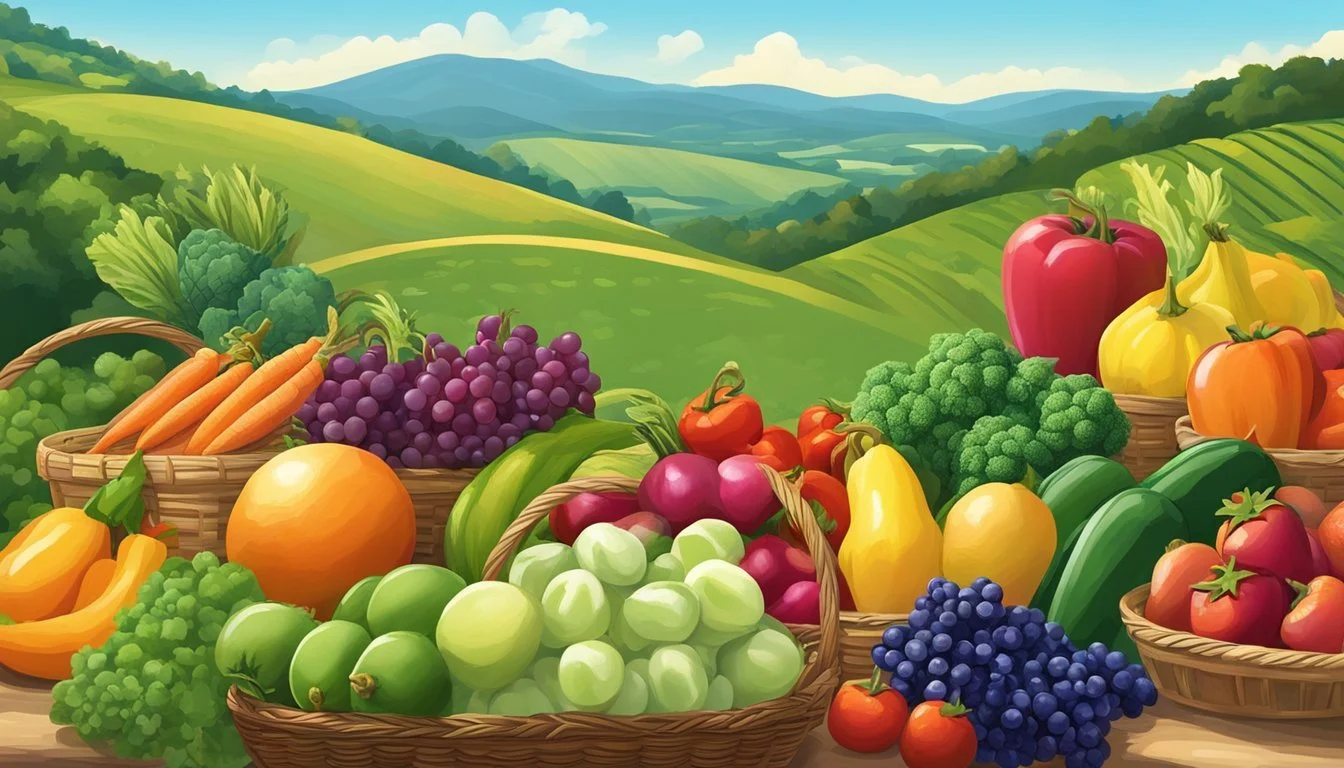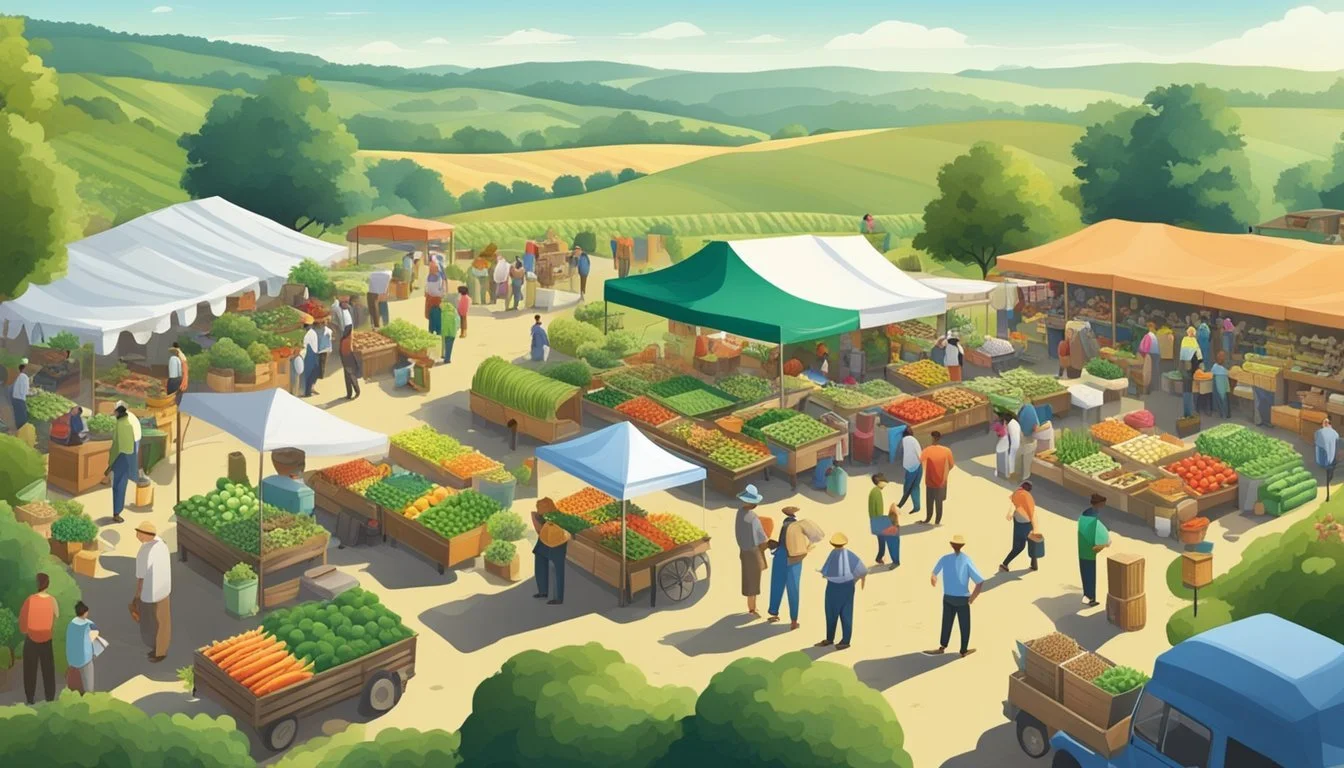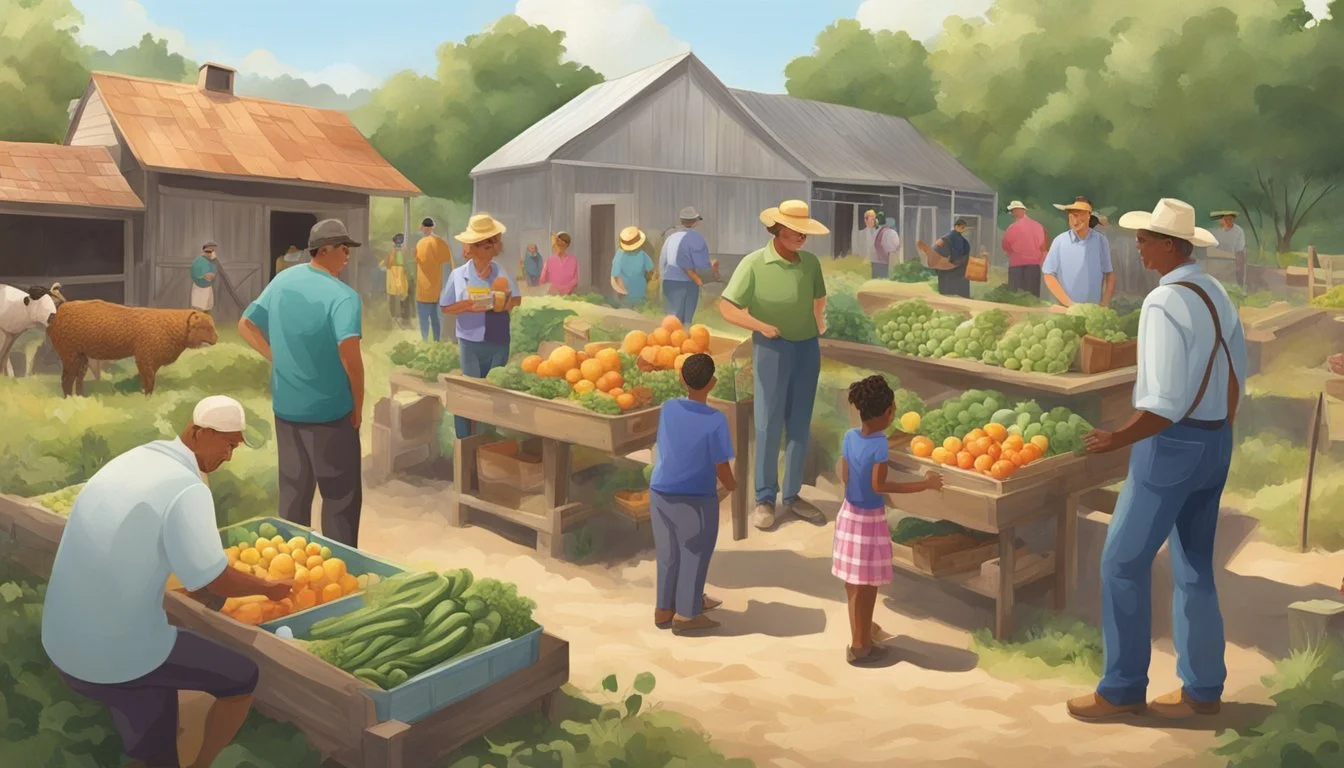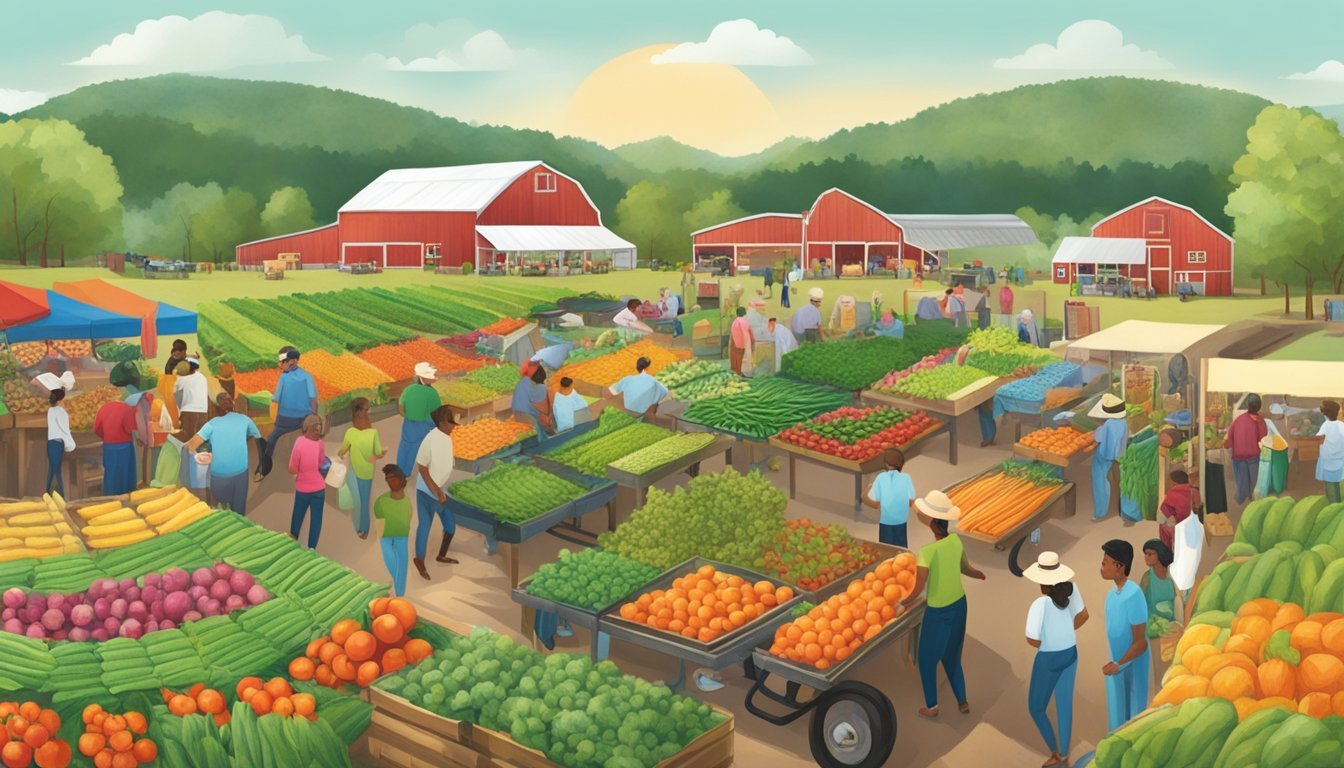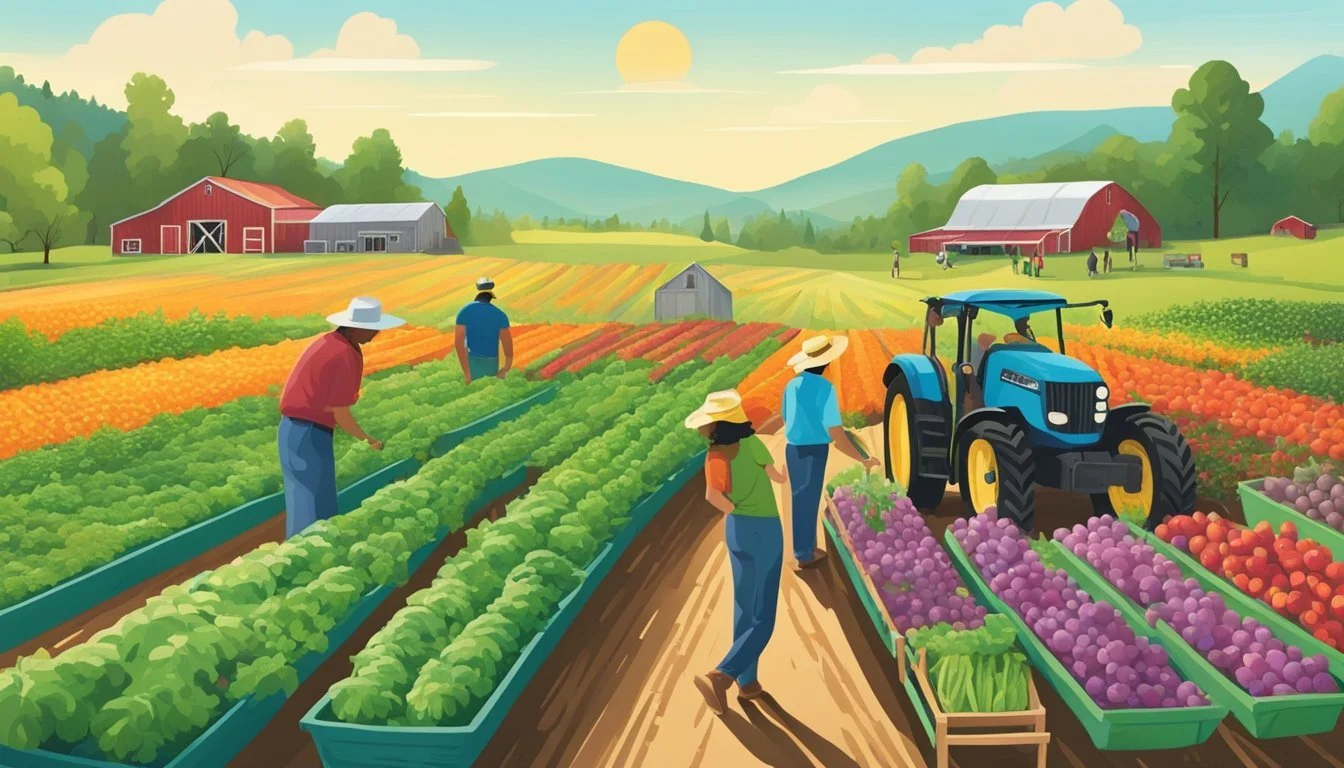Community Supported Agriculture (CSA) in Georgia
Benefits and How to Join
Community Supported Agriculture, commonly known as CSA, has rooted itself deeply in the rich soils of Georgia, providing residents with access to fresh, locally-sourced produce and meats. The CSA model is a partnership between farmers and consumers where individuals purchase "shares" of a farm's harvest in advance, contributing to the farm's operating budget and, in return, receiving a portion of the crops produced. This system benefits both farmers, who gain financial security for their season, and consumers, who enjoy a regular supply of fresh farm products.
In Georgia, the movement toward sustainable agriculture and support for local farmers has seen a significant rise in the number of CSAs. These agricultural arrangements support traditional family farming by ensuring farmers can continue their work while communities benefit from nutritious, fresh food. The CSA model in Georgia has diversified beyond just fruits and vegetables to include options for meats and other farm products, reflecting the state's agricultural variety and the consumers' growing interest in understanding the origin of their food.
Each CSA in Georgia operates uniquely, offering various share sizes and pick-up or delivery frequencies to accommodate different household needs and preferences. By joining a CSA, Georgians directly support the state's agricultural economy and promote healthier eating habits through a steady supply of fresh produce, often grown organically or with responsible farming practices. Thus, the CSA framework not only forges a close-knit bond between local farmers and consumers but also aids in preserving Georgia's agricultural heritage.
The Basics of CSA in Georgia
In Georgia, Community Supported Agriculture programs provide a bridge between local farmers and consumers. Members subscribe to support farms and receive a share of the harvest, forging a community focused on sustainable agriculture.
What is Community Supported Agriculture?
Community Supported Agriculture (CSA) is a model where customers purchase subscriptions, or shares, of a farm’s anticipated harvest. These members make advance payments to cover the anticipated costs of the farm's produce. In exchange, they periodically receive portions of fresh, locally-grown products throughout the farming season. This arrangement benefits the farmers, affording them early-season capital, and members, who receive a regular supply of fresh food.
History of CSA in Georgia
The CSA model was introduced in the United States in 1985. In Georgia, these programs have been embraced by a variety of farms, including those offering organic and naturally-grown options, reflecting the state's commitment to sustainable practices. From the establishment of early programs to the present, CSA membership has expanded, supporting both established and emerging farms and providing Georgian residents access to a diverse array of fresh, seasonal produce and meats.
Benefits of Joining a CSA
Joining a Community Supported Agriculture (CSA) program in Georgia allows individuals to enjoy fresh produce directly from local farms. Subscribers receive multiple benefits, from the quality of the fresh offerings to the support of sustainable farming practices.
Fresh and Seasonal Produce
Members of a CSA have the advantage of receiving fresh and seasonal produce. They can enjoy a weekly or bi-weekly bounty of fruits and vegetables at the peak of their flavor and nutritional value. CSA shares often include a variety of produce, which can range from heirloom tomatoes and leafy greens to succulent peaches and crisp apples depending on the season.
Vegetables: A mix of root vegetables, leafy greens, and other garden staples.
Fruit: Seasonal selections such as berries in the summer and citrus in the winter.
Herbs and Flowers: Freshly cut, adding aroma and beauty to the weekly share.
Supporting Local Agriculture
Subscribing to a CSA directly benefits local farmers and the agricultural economy of Georgia. It provides financial stability to the growers by ensuring a consistent market for their farm products. By participating, members help to sustain and empower local farmers, fostering community and preserving traditional farming practices.
Financial Stability: Pre-paid CSA memberships provide farmers with early-season capital.
Community Connection: Shareholders often have the opportunity to visit the farms and meet the people who grow their food.
Environmental Impact
CSA programs have a positive environmental impact due to their support for organic and natural farming methods that are less taxing on the land. These practices promote biodiversity, reduce the use of synthetic pesticides and fertilizers, and decrease the carbon footprint associated with long-distance transportation of food.
Organic Practices: Use of natural methods to nurture the soil and control pests.
Reduced Carbon Footprint: Minimal transportation distance from farm to table.
By joining a CSA in Georgia, members treat themselves to the freshest local produce, champion regional farmers, and contribute to the health of the planet through environmentally conscious consumer choices.
How to Choose a CSA in Georgia
When selecting a Community Supported Agriculture (CSA) program in Georgia, one should consider the types of shares available and the structure of membership fees to find an option that best aligns with their food preferences and budget.
Types of Shares and Products Offered
Georgia's diverse CSAs offer an assortment of share types, tailored to different dietary needs and preferences. Members can typically choose from:
Vegetables: A staple of CSA shares, often including a variety of seasonal crops.
Fruit: Selections can range from common to specialty fruits, depending on the farm.
Meat: Some CSAs provide options for grass-fed, antibiotic-free, or organic meats.
Eggs: Fresh, often pasture-raised eggs are an add-on or included in certain shares.
Dairy: This can include milk, cheese, and yogurt from local dairies.
Bread: Artisanal breads may be available from local bakers.
Honey, and more.
Before committing, individuals should inquire about how the CSA handles seasonal variety and what happens in the case of a poor harvest since product availability can shift.
Understanding CSA Membership Fees
Membership fees are the financial commitment made by members at the start of a growing season for their share of the CSA's output. These fees can vary considerably, with factors influencing the cost including:
Share size: Full or half-shares to accommodate different household needs.
Production methods: Organic or sustainable practices may affect pricing.
Product range: Comprehensive shares with meats and dairy are typically pricier.
Memberships might be paid upfront or in installments. A clear understanding of the fee schedule ensures members are comfortable with the payment plan. Some CSAs might also offer financial assistance or sliding scale fees to accommodate a wider range of economic capabilities.
CSA Membership and Management
Community Supported Agriculture in Georgia relies on a symbiotic relationship between farmers and members that emphasizes the mutual benefits and responsibilities of each party. The CSA model not only facilitates direct sale of produce to customers but also integrates them into the farm’s ecosystem through shared risks and engagement.
Member Responsibilities and Engagement
Members typically commit to a CSA by purchasing a share of the farm's harvest in advance. This upfront payment is fundamental to stabilizing the farm's revenue and initiating a strong customer-farmer relationship. In return, members receive regular distributions of the farm's output, which might include fruit, vegetables, and sometimes additional farm products. Engaging members may also have opportunities to visit the farm, participate in events, or volunteer, fostering a deeper connection and understanding of the agriculture process.
Membership engagement responsibilities often include:
Financial Commitment: Payment upfront for a season's produce.
Collection: Regularly picking up their shares from designated locations.
Flexibility: Understanding the share's content can vary based on harvest yields.
Risk Management and Shared Responsibilities
Inherent in the CSA model is the concept of shared risk. When customers become members, they share in the potential fluctuations of the farm’s production due to weather, pests, or other unforeseen factors. This risk-sharing encourages a sense of community and investment in the success of the farm.
For the management of these risks, the entities involved may adopt various strategies:
Transparent Communication: Keeping members informed about the farm’s condition and produce availability.
Diversified Crops: Minimizing risk by growing a variety of crops.
Member Feedback: Integrating member preferences and feedback into planning and crop selection.
Risk management responsibilities are shared and might include:
Understanding the agricultural challenges leading to fluctuations in produce availability.
Supporting the CSA through the highs and lows of a farming season.
Georgian CSA Farms
Georgia's CSA farms stand out for their commitment to fresh, locally-sourced produce and support of sustainable agriculture. These farms enable a direct connection between consumers and their food sources.
Profiles of Notable Farms
Serenbe Farms, located in the sustainable community of Serenbe, south of Atlanta, is known for its organic produce and engaging community programs. Riverview Farms operates near Atlanta, offering a variety of organic meats and vegetables, hosting farm events, and participating in local farmers' markets.
Heritage Farm in Bowdon has established itself as a family-run operation with a wide range of offerings through their CSA program, including vegetables, eggs, and meats. Rodgers Greens and Roots Organic Farm in Douglasville contributes to the organic movement with 15 acres dedicated to vegetables and an additional 5 acres for perennial fruit orchards.
Diversity and Practices
Georgia's local farms are characterized by a diverse array of cultivation practices catering to the ecological integrity of the region. These practices often include organic farming, cover cropping, rotational grazing, and the implementation of integrated pest management.
Organic Certification: Many farms, such as Rodgers Greens and Roots Organic Farm, rigorously adhere to organic standards, ensuring that their production methods promote ecological balance.
Sustainable Techniques: Techniques that bolster soil health and reduce carbon footprint are commonly applied. Farms near urban centers like Atlanta integrate these methods to balance productivity with environmental stewardship.
Regional Highlights
Atlanta and its surroundings stand out for an extensive network of CSAs and family farms. The region benefits from a variety of local products, as CSAs adapt to different microclimates within Georgia, from the fertile grounds near Calhoun to the rich soils around Douglasville.
Farmers Markets: Many Georgian CSA farms extend their reach by participating in farmers' markets, providing local residents with additional options to buy fresh and seasonal products directly from the producers.
Impact on the Georgia Community
The growth of Community Supported Agriculture (CSA) has significantly influenced Georgia’s local economies and social fabric. CSA programs foster a symbiotic relationship between consumers and farms, while championing the freshest local produce and inclusive opportunities for diverse populations, including refugees.
Economic Contributions
In Georgia, CSA programs have become an integral component of the state's agricultural economy. Purchasing shares from local farms allows consumers to support farmers upfront, providing financial stability and enabling farmers to focus on quality and sustainable practices.
Financial Predictability for Farmers: By partaking in CSA programs, members pay for a season's produce in advance, granting farmers in regions like Atlanta a more predictable income stream.
Boost to Farmers Markets and Local Commerce: CSA distribution often occurs at farmers markets, which stimulates local commerce and increases foot traffic benefiting other market vendors.
Social and Cultural Dynamics
The introduction of CSA into Georgia's agricultural landscape has also enriched the state's social and cultural dynamics.
Community Engagement: Local farms have cultivated closer ties with residents, strengthening community bonds and fostering engagement through farm visits and events.
Support for Diverse Populations: CSA models in Georgia open pathways for refugee communities to access fresh food, participate in local agriculture, and live off the land sustainably.
Educational Opportunities: These programs educate the public about the origins of their food and the importance of supporting local agriculture.
CSAs have effectively knit together various threads of the Georgian community, intertwining economic advancement with social cohesion.
Organic and Sustainable Farming in Georgia
In Georgia, organic and sustainable farming practices are increasingly embraced. These methods balance environmental responsibility, community health, and economic viability.
Certification and Farming Practices
Certified organic refers to farms that adhere to a federally regulated standard, which often includes the use of organic seed, abstention from synthetic herbicides, pesticides, and fertilizers, and employing soil and water conservation techniques. In Georgia, certified organic farms are part of a growing sector that uses sustainable methods such as crop rotation, cover cropping, and integrated pest management to maintain soil health and minimize environmental impact.
Certified Naturally Grown (CNG): A certification less rigorous than USDA's organic but still ensuring farmers follow natural practices.
Biodynamic: Some farms in Georgia follow biodynamic practices, which take a holistic view of agriculture, focusing on ecological and spiritual approaches.
Benefits and Challenges
Farming organically in the Southeast presents both unique advantages and difficulties:
Benefits
Healthier soils through natural practices
Enhanced biodiversity on pastured systems
Challenges
Humidity and heat that can increase pest pressures, demanding more innovative integrated pest management strategies.
Market access can be uneven, with some farmers needing to travel significant distances to reach consumers interested in organically grown produce.
Organic meat production, such as grass-fed beef and pastured Berkshire pork, offers a healthier alternative to conventionally raised meats, boasting benefits like improved animal welfare and meat quality. However, farmers face challenges including higher feed costs and the need for extensive land to raise grass-fed and pastured animals effectively.
Educational Opportunities in CSA
Community Supported Agriculture (CSA) programs in Georgia not only provide customers with fresh farm products, but also offer unique educational opportunities that foster a stronger relationship between the community and local agriculture.
Workshops and Farm Visits
CSA programs often host workshops that are designed to teach members about sustainable farming practices. These can range from organic gardening techniques to composting methods. By participating, members gain practical knowledge that they can apply in their own gardens or support sustainable initiatives. Furthermore, farm visits are a key part of the educational experience, offering firsthand insight into the workings of a farm. Visitors can witness the lifecycle of farm products, from planting to harvest, under the guidance of experienced farmers.
Educational Topics Covered in Workshops:
Organic farming
Soil health and composting
Community Engagement and Learning
The educational aspect of CSA extends beyond the individual to encompass community engagement and learning. Through involvement in CSAs, members become part of a collective effort to support local farms and partake in the data collection that can help improve agricultural processes. This communal participation promotes a deeper understanding of the importance of local, sustainable food systems. CSA memberships offer an educational exchange, where both farmers and customers learn from one another — farmers share their expertise on food production, while consumers bring their preferences and feedback, shaping the CSA offerings to better meet community needs.
Engagement Activities:
Community potlucks with farm-fresh ingredients
CSA newsletters with agricultural insights
Volunteer opportunities at the farm
Future Prospects of CSA in Georgia
In Georgia, the trajectory of Community Supported Agriculture is marked by a notable shift towards sustainable practices and a steady increase in consumer participation. This section examines the current trends that are shaping the future growth of CSAs in the state and explores the innovations that may drive their development further.
Trends and Growth Potential
Community Supported Agriculture in Georgia is benefiting from a growing consumer interest in sustainable and locally sourced foods. This trend is supported by data reflecting an increasing number of CSAs across the state. Georgia's CSAs are becoming more diverse, offering not only a variety of vegetables and fruits but also high-quality products such as fresh-cut flowers, meats, dairy, and artisanal breads. Indeed, the expansion of product ranges could facilitate a broader appeal, potentially attracting a more extensive consumer base. The emphasis on fresh and high-quality produce continues to be a significant draw for consumers, who are increasingly health-conscious and environmentally aware.
Number of CSAs: Growing
Consumer Interest: Increasing
Product Diversity: Expanding
Focus: Sustainable, high-quality produce
Innovation and Development
Innovation within Georgia's CSAs is evident in the development of new business models that escalate their reach and efficiency. Technologies for better crop management and distribution, coupled with creative marketing strategies, are being employed to enhance the quality and appeal of CSA produce. For instance, some CSAs in Georgia are implementing data-driven approaches to track consumer preferences and optimize their offerings. There is also a potential for CSAs to partner with tech companies to improve supply chain logistics and offer more customizable shares to their members. These innovations not only support the growth potential of CSAs but also help to maintain the high standard of fresh products they are committed to providing.
Business Model Evolution: Ongoing
Technological Advancements: Advancing
Marketing Strategies: Innovating
Partnerships: Developing
By upholding the values of quality and sustainability, and by embracing innovation, Georgia's CSAs are poised for significant growth and development in the foreseeable future.
Supporting Resources
The following resources provide insights into the vibrant CSA options across Georgia and offer avenues for additional learning.
List of Georgia CSAs
Georgia's CSA landscape is diverse, with farms like Farmers Fresh CSA, a collective of growers across West Georgia and East Alabama adhering to organic and sustainable practices. Other notable CSA farms include:
Oostanaula River: Surrounded by rich biodiversity, farms here offer some of the freshest produce in the state.
Tucker Farms: Known for a wide selection of vegetables, including specialty items.
Patchwork City Farms: An urban farm delivering locally and naturally grown produce.
Wrecking Barn Farm: Devoted to community growth and providing fresh, organic options.
Burge Organic Farm: A diversified certified organic family farm in operation since 1993.
Fresh Harvest: Provides baskets of organic produce to its CSA members.
Freewheel Farm: This urban Atlanta farm focuses on diverse crops and sustainable practices.
Red Earth Organic Farms: A farm dedicated to organic methods, offering a variety of seasonal produce.
Summer Roots: Cultivates garlic and ginger with a commitment to sustainable farming.
Grandma Brock's Country Farm: Located in Franklin County, provides an assortment of fruit and vegetables.
Dillwood Farms: Offers pasture-raised eggs and practices regenerative agriculture.
Habitat Farms: Nestled in Chattahoochee Hills, known for pastured Berkshire pork and grass-fed lamb.
Chattahoochee River Farms: Situated on flat clay-loam soil, ideal for perennial fruit orchards.
Additional Readings and Research
For those looking to delve deeper into the CSA model and its implications for local agriculture, consider exploring:
Research papers on the impact of CSAs on local economies and sustainable farming practices.
Articles and studies on consumer-producer relationships fostered by CSA memberships.
LocalHarvest: A comprehensive database with detailed information on CSAs across Georgia.
Educational material on organic farming and the significance of the CSA system in promoting food security and community engagement.


